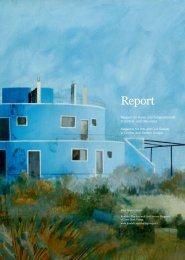Report_Issue 1/2009 - Jubiläum/ 20 Jahre Mauerfall
Report_Issue 1/2009 - Jubiläum/ 20 Jahre Mauerfall
Report_Issue 1/2009 - Jubiläum/ 20 Jahre Mauerfall
Sie wollen auch ein ePaper? Erhöhen Sie die Reichweite Ihrer Titel.
YUMPU macht aus Druck-PDFs automatisch weboptimierte ePaper, die Google liebt.
68<br />
Kontakt Unabhängiges Literaturhaus<br />
TOP 22 –Osteuropäische Schriftsteller und Schriftstellerinnen<br />
im Unabhängigen Literaturhaus NÖ<br />
Das Unabhängige Literaturhaus NÖ lädt in seine Gästewohnung TOP 22 internationale<br />
Autoren und Autorinnen vornehmlich osteuropäischer Herkunft ein. Seit<br />
<strong>20</strong>05 wird dieses Programm von der Erste Bank unterstützt.<br />
Mehr als 70 Gäste haben in den vergangenen <strong>Jahre</strong>n in Krems gearbeitet. Die<br />
während der Schreibaufenthalte entstandenen Texte werden ins Deutsche übersetzt<br />
und in Anthologien, von denen bisher bereits drei erschienen sind, veröffentlicht.<br />
(TOP 22 / Teil I+II+III)<br />
Kontakt Literatur<br />
Jean Améry-Preis für Essayistik<br />
Der Jean Améry-Preis für Essayistik ist eine Auszeichnung für hervorragende Leistungen<br />
auf dem Gebiet des zeitkritischen, aufklärerischen Essays. Seit <strong>20</strong>07 wird<br />
der Améry-Preis vom Klett-Cotta Verlag ausgeschrieben und in Kooperation mit<br />
der Erste Bank finanziert. Der Preis wird alle zwei <strong>Jahre</strong> von einer aus Literaturwissenschaftlern<br />
und Kritikern bestehenden Jury vergeben.<br />
<strong>20</strong>07 erhielt der slowenische Autor Drago Jančar den Preis.<br />
In der Begründung der Jury heißt es:<br />
„In vielen Büchern bis hin zu dem zuletzt erschienenen Essayband ,Brioni‘ hat sich<br />
Jančar als eigenständiger Denker, souveräner Stilist und als ein Autor erwiesen,<br />
der die mitteleuopäische Geschichte mit all ihren Verwerfungen aufnimmt, um<br />
immer neu die Grundfragen unserer Epoche zu verhandeln.“<br />
Imre Kertész erhält den Jean Améry-Preis für Essayistik <strong><strong>20</strong>09</strong>.<br />
In der Begründung der Jury heißt es:<br />
„Der Nobelpreisträger des <strong>Jahre</strong>s <strong>20</strong>02 ist in seinem gesamten Werk, vor allem<br />
auch in seiner Essayistik dem Geiste Jean Amérys sehr nahe. Diese wesentliche<br />
Nähe hat er konkret in seinem Essay ,Der Holocaust als Kultur‘ artikuliert: als entschiedene<br />
Kritik an jeglichem Totalitarismus und leidenschaftliche Verteidigung<br />
der Freiheit des Menschen. Kertész’ Essayistik arbeitet an einem aufgeklärten<br />
Denken, das seine Lehren aus der Barbarei des Faschismus und des Kommunismus<br />
gezogen hat, und für ein Europa, das entweder ein aufgeklärtes freies Europa<br />
sein wird oder einmal nicht mehr sein wird.“<br />
TOP 22 – Eastern European writers in the Unabhängiges Literaturhaus NÖ<br />
The Unabhängiges Literaturhaus NÖ (Lower Austrian Independent Literature<br />
House) invites international authors, most of them from Eastern Europe, to stay<br />
in its guest apartment TOP 22. Erste Bank has supported this programme since<br />
<strong>20</strong>05. More than 70 guests have worked in Krems over the past number of<br />
years. The texts written during the time spent there are translated into German<br />
and published in anthologies, three of which have already appeared. (TOP 22 /<br />
parts I+II+III)<br />
TOP 22 / part I<br />
Contributions by: Petr Borkovec (CZ), Larissa Schulmann (RU), Lajos Parti Nagy (HU),<br />
Anton Lysakowski (BY), Radek Knapp (PL), Kateřina Rudčenková (CZ), Pashov (BG),<br />
Jolanta Stefko (PL), Mila Haugová (SK), Natasha Korsakova (RU), Mariusz Grzebalski<br />
(PL), András Forgách (HU), Timur Sulfikarow (TJ), Alfredo Bauer (AR), Chen Danyan (CN),<br />
Pavel Kolmačka (CZ), Aleš Šteger (SI), Marjana Gaponenko (UA), Lela Purtskhvanidze<br />
(GE), Marek Bienczyk (PL)<br />
TOP 22 / part II<br />
Contributions by: Dušan Šarotar / Esad Babačić (SI), Marián Hatala (SK), Gheorghe<br />
Crăciun (RO), Reet Kudu (EE), Tautvyda Marcinkeviciute (LT), Ales Rasanau (BY), Károly<br />
Méhes / Péter Zilahy (HU), Jáchym Topol / Tomás Mika / Milena Oda (CZ), Patricia<br />
Büttiker / Urs Berner / Sabina Naef / Ivo Ledergerber / Peter Stamm / Elisabeth<br />
Wandeler-Deck (CH), Jaffa Zins (IL), Juli Zeh (DE)<br />
TOP 22 / part III<br />
Contributions by: Michal Hvorecký (SK), Sonja Porle (SI), Maja Novak (SLO), Robert<br />
Şerban (RO), Nikola Madzirov (MK), Ivo Kazar (BG), Jaroslav Rudiš (CZ), Paulo Lins (BR),<br />
Judith Arlt (CH), Ottó Tolnai (HU), Jürgen Theobaldy (CH), Jana Benová (SK), Andrej<br />
Morović (SI), Vlado Žabot (SI), Oksana Sabuschko (UA), Lidija Dimkovska (MK), Juri<br />
Andruchowytsch (UA), Eginald Schlattner (RO), Klaus Merz (CH), Kaspar Schnetzler (CH)<br />
Herausgeber / Editor: Wolfgang Kühn (ULNOE)<br />
Verlag / Publisher: Edition Aramo<br />
Kontakt Literature<br />
Jean Améry Essay Prize<br />
The Jean Améry Essay Prize is awarded for exceptional achievements in the area<br />
of critical essays imbued with the spirit of the Enlightenment. The Améry Prize has<br />
been organised since <strong>20</strong>07 by Klett-Cotta Verlag and is financed in cooperation<br />
with Erste Bank. The prize is awarded every two years by a jury made up of literary<br />
scholars and critics.<br />
In <strong>20</strong>07 Slovene author Drago Jančar was awarded this prize.<br />
The jury explained its decision as follows:<br />
“In many books up to and including the recent volume of essays ‘Brioni’ Jančar has<br />
shown himself to be an independent thinker, a sovereign master of literary style<br />
and an author who has absorbed central European history with all its shifts and<br />
dislocations so as to adopt new approaches in debating the basic questions of our<br />
epoch.”<br />
Imre Kertész is the recipient of the <strong><strong>20</strong>09</strong> Jean Améry Essay Prize.<br />
The jury explained its decision as follows:<br />
“In his entire work, but above all in his essay writing, the Nobel Prize Winner for<br />
<strong>20</strong>02 is very close to the spirit of Jean Améry. He concretely articulated this closeness<br />
in his essay ‘The Holocaust as Culture’: as a decisive critique of every form<br />
of totalitarianism and passionate defence of human freedom. Kertész’ essays are<br />
based on an enlightened way of thinking that has drawn its lessons from the barbarianism<br />
of fascism and communism and stands for a Europe that will either be<br />
enlightened and free or will cease to exist.”<br />
www.kontakt.erstegroup.com




